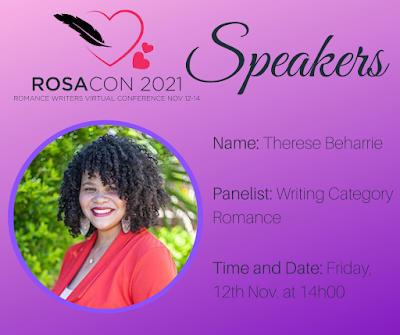 |
| Image by Bingo Naranjo from Pixabay |
Thursday, November 25, 2021
Trope-tastic
Friday, October 29, 2021
Meet Our 2021 ROSACon Speakers: Harry Wallett
Don't miss his presentation on Ghostwriting at ROSACon 2021! Book your tickets today!
 |
Book Now |
Thursday, October 28, 2021
Meet Our 2021 ROSACon Speakers: Therese Beharrie
Don't miss her presentation Writing Category Romance at ROSACon 2021! Book your tickets today!
 |
Book Now |
Tuesday, September 14, 2021
Blue Sky Thinking - A Cure for Writer's Block?
Have you ever sat down at your manuscript and had no idea where to start or where to go next?
Don’t worry. We’ve all been there: staring out of the window, doom scrolling through our social media or making copious cups of tea.
But Blue Sky Thinking can help. Blue Sky Thinking can get you over your writer’s block and into the next scene.
Blue Sky Thinking is defined as ‘creative ideas that are not limited by current thinking or beliefs’ In other words, it is the kind of thinking that is out of the box, perhaps generating ideas that might be considered absurd.
Children are better at Blue Sky Thinking than adults. They will draw a picture of a castle on the back of a truck, or mole’s home underground with electricity and water. What about adults?
Unfortunately we realise our ideas and words have consequences. What we say or write affects the way people see us, think of us and treat us. We become self-conscious and we start judging our ideas before they have had a chance to breathe life.
And then, we curate them so fast, we barely even see them before we crush them. As writers we can end up sitting, staring at a blank page or a screen, with nothing.
Or, we may find ourselves agonising over and editing words we have written, as we write. We edit and write at the same time until our creative flow grinds to a halt. We can take years to finish a book or we don’t finish it at all.
If you apply Blue Sky Thinking to your writing process, you can prevent this from happening. You will need to put your editor self on hold, only your writer self will be allowed at your desk. Tell yourself that, in the writing process. your ideas have no limits. There will be no judgement and no consequences. (That will only come during the editing process.)
Write all your ideas for your story down, however crazy, wild, silly and ridiculous they might be. Write them down. Fill the page with insanity, absurdity, bizarre character traits, leaps of coincidence, well used tropes, suspension of disbelief and incongruent plot twists. This is Blue Sky Thinking, where the sky is the limit because there is no limit. This is where your ideas give birth to more ideas, until you have so many ideas that there will be one that fits your story, or it will fit the direction your story is taking, or it will lead your story in an amazing direction or it will spark the beginning of a new story.
I have found the less I work on a book, or the longer time I leave between writing sessions, or the more I try to edit the existing work, the more difficult the whole process is. But if I let my ideas flow, without necessarily knowing where they are going, then my existing ideas grow, and more new ideas come to me.
So if you’re stuck in a rut and don’t know the way out, hang up your editorial hat. Look out the window at the sky and tell yourself there is no judgement at your desk. Let your ideas beget ideas. Apply Blue Sky Thinking and there will be no limit to your creative process.





